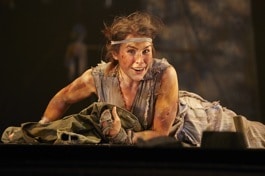Hobart Baroqie Festival: L’isola disabitata
It says something about Hobart that I’ve witnessed more wonderful singing here in six months than in my 12 years in Melbourne. This island state rarely sees our national performing companies, but makes up for this with a series of boutique festivals, often featuring international class acts.

L’isola disabitata from The Royal Opera Covent Garden, the opener for Leo Schofield’s latest festival venture, Hobart Baroque, lived up to the standard with world-class singing from its young cast and an innovative theatrical take on an early classic period opera. This is the first time The Royal Opera House has presented an opera in Australia, and Hobart’s Theatre Royal was the perfect venue for this production, which originally appeared in London in 2010.
Composed by Hadyn in 1779 as a courtly entertainment, L’isola disabitata is a charming but lightweight piece. With just four soloists and no chorus, it easily lends itself to a mannered, stilted interpretation, which possibly accounts for its general absence from the standard operatic repertoire. However young director Rodula Gaitanou transcended the surface limitations of the opera with her intensely theatrical and contemporary slant on the story of young lovers abandoned on a deserted island.
Gaitanou made her ROH directing debut with this piece at the Linbury Student Theatre. Originally a musician, Gaitanou trained in movement at the International Theatre School Jaques Lecoq France and believes opera must contain spectacle if it is to communicate to modern audiences. To this end, her L’isola disabitata is set in a post-apocalyptic wasteland that, sans standard sets and wings, reaches to the empty back walls of the stage.
The visual spectacle was built on by her collaborator, lighting designer Simon Corder, whose intricate projection covered every stage surface with painterly effect, with changing light tones to signify the progression of day. The stage design, by Jamie Vartan, again was deceptively simple and a triumph of minimalism where, for example, the progressive placement of sticks in the ground gained significance as the story unfolded.
The attention to detail attention extended to every movement of characters; the four singers were in fact never offstage, but remained in (slow-mo) character when they exited the centre round platform. Not only were they already onstage, in character, as the audience entered, but continued their business during the interval when the audience was absent.
The whole of theatre effect was reinforced from the opening moments when the overture started above the sounds of the chatting audience – no silent walk in and applause for the conductor Oliver Gooch. The successful absence of a fourth wall between the singers and auditorium while managing to retain the momentum of the drama, spoke well of the emphasis Gaitanou places on storytelling and the breadth of talent in her cast.
Each cast member is a wonderful example of the new breed of opera performer: brilliant singers all, but with movement and acting skills equal to the extreme demands of the production.
With a generous warmth and spontaneity, and singing close to perfection, soprano Anna Devin as the young feral Silva communicated pure joy. Baritone Changhan Lim (Enrico) also stood out as a star of the future with his dynamic immediacy in voice and physicality.
As happens with many new directors, Gaitanou had action through every moment of singing, not only from the soloists, but often with accompanying business by other cast members. Though always relevant, the unremitting activity left no time for repose. This kind of opera lives on through the beauty of its music, and I would have appreciated more opportunities to appreciate the glorious singing, and the sensitive period sounds of the Orchestra of the Antipodes. As it was, the visuals tended to dominate, yet I trust that as Gaitanou matures as a director, she will find that elusive balance between music and drama that has obsessed opera makers for centuries.

Pingback:Hobart Baroque – L’isola disabitata | Carmen's Verandah